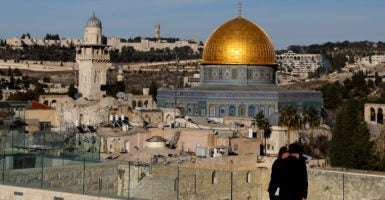As a presidential candidate speaking to American supporters of Israel, Donald Trump vowed that, if elected, “We will move the American Embassy to the eternal capital of the Jewish people, Jerusalem.”
In June, Trump signed the same waiver his three predecessors signed to keep the U.S. Embassy in Israel in Tel Aviv. But this week, he is set to make an announcement on his plans.
Reports last week said he planned to announce the United States recognizes Jerusalem as the capital of Israel, but take no action on moving the embassy. However, on Sunday, Trump’s son-in-law and senior adviser, Jared Kushner, told the Brookings Institution the president hasn’t decided on whether to recognize the capital or move the embassy.
White House spokesman Hogan Gidley told reporters Monday on Air Force One that the president isn’t wavering on his plan.
“That’s obviously been an issue we’ve received a lot of incoming on today,” Gidley said. “The president has been clear on this issue from the get-go; that it’s not a matter of if, but a matter of when. No action, though, will be taken on the waiver today, and we will share a decision on the waiver in coming days.”
Trump will reportedly announce his intentions on Wednesday. He has a Cabinet meeting that day, and typically gives public remarks either before or after such meetings. On Thursday, the president is hosting a Hanukkah reception at the White House.
Recognizing Jerusalem would essentially reaffirm existing law. In 1995, President Bill Clinton signed the Jerusalem Embassy Relocation Act, which formally recognized Jerusalem as the capital of Israel.
The law called for the capital to be moved from Tel Aviv to Jerusalem no later than 1999. However, the law allowed the president to issue a waiver every six months to keep the embassy in Tel Aviv if necessary to protect national security interests. Presidents Clinton, George W. Bush, Barack Obama did so, and in June, Trump also issued a waiver.
Still, calling for the recognition would be a “wonderful statement,” said Sarah Stern, president of the Endowment for Middle East Truth, a pro-Israel think tank.
“Israel is the only country in the world that is denied the right to choose its capital city,” Stern told The Daily Signal. “This itself is a symbol of huge progress in a 70-year battle. It’s always easy for politicians and candidates to get a standing ovation by promising to move the capital.”
Over the weekend, Palestinian President Mahmoud Abbas warned: “Any American step related to the recognition of Jerusalem as capital of Israel, or moving the U.S. Embassy to Jerusalem, represents a threat to the future of the peace process and is unacceptable for the Palestinians, Arabs, and internationally.”
As violence already persists, Stern is skeptical that any such move could be blamed for inflaming violence.
“America has been bullied by the threat of violence in the Muslim world,” Stern said. “It’s a self-fulfilling prophecy that has encouraged the use of violence. … There are a lot of flashpoints in the Middle East right now, but it is always a delicate time in the Middle East.”
Moving the embassy has been a “third rail” for Middle East policy because of fears it would give Iran and other anti-American, anti-Israel forces a reason to go after moderate Arab governments, said James Phillips, senior research fellow for Middle Eastern affairs at The Heritage Foundation.
“This would correct a historic anomaly, because the U.S. has a consulate in East Jerusalem representing its interests to the Palestinian Authority, but there is nothing for Israel,” Phillips told The Daily Signal. “But it could provoke anti-American riots and have a negative impact on the Israeli-Palestinian peace negotiation the administration is working on.”
To mitigate the risk, Phillips said, “The administration should be clear this will have no impact on Muslim holy places.”
A move for recognition alone would simply reaffirm U.S. policy, but this is likely foreshadowing future actions, said Jonathan Schanzer, vice president of the Foundation for Defense of Democracies, a national security think tank.
“The president has committed to ultimately making a shift, and this is the groundwork for that shift, not all at once, but helping the region acclimate,” Schanzer told The Daily Signal.
The administration likely has other plans, Schanzer said, and stressed it’s not as simple as Trump keeping a campaign promise or potentially disrupting the peace process.
“There could be other things the president is offering the Palestinians in a larger package,” he said. “This could be a regional architecture. It’s not peace, but it’s a second cousin. Some Arab states are already willing to help Israel if Israel will help them with Iran. … The Palestinians may be pushed to a place they aren’t familiar with. The U.S. is not allowing them to control the terms. And if there is a regional diplomatic architecture, the Palestinians will not want to be left behind.”
The promise of finally recognizing Jerusalem and moving the embassy has been just a talking point for too many presidents, said Frank Gaffney, president of the Center for Security Policy.
In a public statement, Gaffney said:
For decades, successive winning presidential candidates of both parties have promised to exercise existing statutory authority to move the embassy, only to recoil from doing so once in office.
Usually, this bait-and-switch was justified by fear of Arab threats of violence if America effectively endorsed Israel’s claim to Jerusalem.
Not only should President Trump honor his repeated pre-election commitment and relocate the embassy; while he’s at it, he should also close the Washington office of Israel’s abiding enemy, and ours, the Palestine Liberation Organization.
This story was updated to included a comment from White House spokesman Hogan Gidley.




























